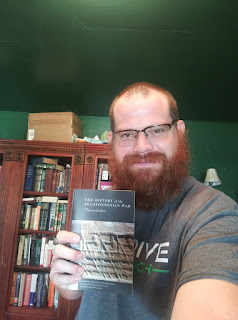My goal was to read a list of classic and famous historians in chronological order. I called this list my practice grad-school (I’ll have to write a blog post about). What better historian to start with, than the Father of History himself, Herodotus! I love history and have really enjoyed reading Herodotus’ The Histories but I didn’t know what I was getting myself into. I did not have any background in Greek history, and Herodotus can be a little disorienting, so here is a post of what I did to help get through one of the greatest works in history.
First off, Herodotus doesn't write like we write today so
get ready! Herodotus will frequently interrupt himself with background
narrative or geographical/ethnographical info, all of it is super interesting
but a bit jarring. Classicists call these interruptions “digressions.” In Book
IV, Herodotus describes Dareios’ campaign against the Scythians from paragraph
1-4 then Herodotus interrupts himself and from paragraphs 5-82 he talks of Scythian
culture. Then in paragraph 83 he starts talking of Dareios preparing his
campaign again. There are more jarring examples but this is the longest if you don’t
count book II.
He also gives a lot of names, people, people's fathers, places,
places fathers. Here is what I mean...
“Moreover of the Persians there
fell here, besides many others of note, especially two sons of Dareios,
Abrocomes and Hyperanthes, born to Dareios of Phratagune the daughter in
marriage to Dareios gave also with her all his substance, because she was his
only child. 7.224b”
Now if you can read that sentence once and get what the heck
he is talking about, you’re a whole lot smarter than I. Granted it was written
2400 years ago and then translated into English. Perhaps I shouldn’t criticize too
harshly.
Chronology can also be hard to keep track of if you are not
familiar with ancient Greece. Herodotus seems unworried about providing regular
dates, of course he didn't know that Christ would be born some 400 years in the
future so BC wouldn’t have made any sense to him. Nor did he realize that he wasn’t living in
the “common era,” so “Before the Common Era (BCE)” wouldn’t have occurred to
him. His timelines are all over the place and kind of vague, most coffee
table tomes would help keep the chronology strait. I used "Empires
that Shook the World" by Andrew Taylor, it is a typical coffee table book.
It has sections on the Athenian Empire (or Delian league) and the Achaimenid Empire
(or the Persian Empire), it isn’t a spectacular work but it does have plenty of
pictures, timelines, graphs and maps to help guide you through ancient Greece.
I also took advantage of two audio resources, the Open Yale
Courses (https://oyc.yale.edu/) they can be found wherever you get your podcasts
as well as from the website provided. I listened to Professor Donald Kagan’s
Ancient Greece class. I highly recommend it for general knowledge of Greek
history. Here is a full bio provided by Yale (https://history.yale.edu/people/donald-kagan). I also took advantage
of my public libraries resources which included The Great Courses’ presentation
on “Herodotus.” It is taught by Professor Elizabeth Vandiver. Here is a full
bio provided by The Great Courses (https://www.thegreatcourses.com/professors/elizabeth-vandiver/).
This has been a great resource for more specific context for The Histories
itself.
I hope you enjoy your journey through The Histories. And when you know your Perses from your
Persians, you can go to your friend’s party and when they start praising that 300
movie! You can pull out book VII and say “well Herodotus actually said…,” that
may be only my fantasy.
P.S.
If you are interested, my next book on my list is
Thucydides! Go figure.
Herodotus. Herodotus:
The Histories. New York: Barnes & Nobles Books, 2004.
Taylor, Andrew. Empires
That Shook the World. New York: Metro Books, 2008.




No comments:
Post a Comment